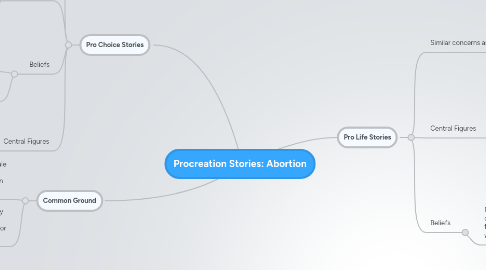
1. Pro Choice Stories
1.1. The pro-choice narratives were drawn from women activists who organized to defend the Fargo abortion clinic; most were born between 1942-52
1.1.1. All were influenced as young adults by the social unrest of the late 1960s and early 1970s
1.2. Stereotypes
1.2.1. accusations made by right-to-life opponents that abortion advocacy means an oppositional stance toward marriage, children, and community
1.2.2. Godless
1.3. Beliefs
1.3.1. generally, the agenda of women on the pro-choice side is to use legal and political means to extend the boundaries of the domain of nurturance into the culture as a whole
1.3.2. cultural values of nurturance which, in their view, women represent.
1.4. Central Figures
1.4.1. Kay Bellevue, an abortion rights activist since 1972
1.4.1.1. Oldest of seven children, her father was a Baptist minister
1.4.1.1.1. Became strong feminist advocate after realizing how little physicians know about the female body
1.4.2. Janice Sundstrom
1.4.2.1. Began questioning the Church and Pro-Life after beginning to take birth control
2. Common Ground
2.1. Both sides view their work as a full scale social crusade to enhance rather than diminish women's position in American culture
2.2. both sides share a critique of a society that increasingly stresses materialism and self-enhancement while denying the value of dependents and those who care for them
3. Pro Life Stories
3.1. Similar concerns as Pro Choice
3.1.1. Right-to-life activists express a similar concern for the preservation of female nurturance
3.2. Central Figures
3.2.1. Shirley, a 63-year-old widow, part-time nurse, mother of six, and a well-known member of Fargo's comfortable middle class
3.2.1.1. When her son won 'Teacher of the Year', it caused her to reflect on what a loss to society it would have been had she aborted him
3.2.1.1.1. "What losses are we having in society now?"
3.2.2. Helen, once a pro-choice supporter
3.2.2.1. 'Converted' to pro-life after the death of her mother, who strongly opposed abortion
3.2.3. Roberta
3.2.3.1. sees in abortion a reevaluation of biological reproduction in the cost-benefit language and mores of the marketplace, and an extension of a more pervasive condition, the increasing commercialization of human relations, especially those involving dependents.
3.2.3.1.1. In this view, legal abortion represents the loss of a locus of unconditional nurturance in the social order.
3.3. Beliefs
3.3.1. For most right-to-lifers, abortion represents an active denial of the reproductive consequences of sex and a rejection of female nurturance, and thus sets forth the possibility of women structurally becoming men
